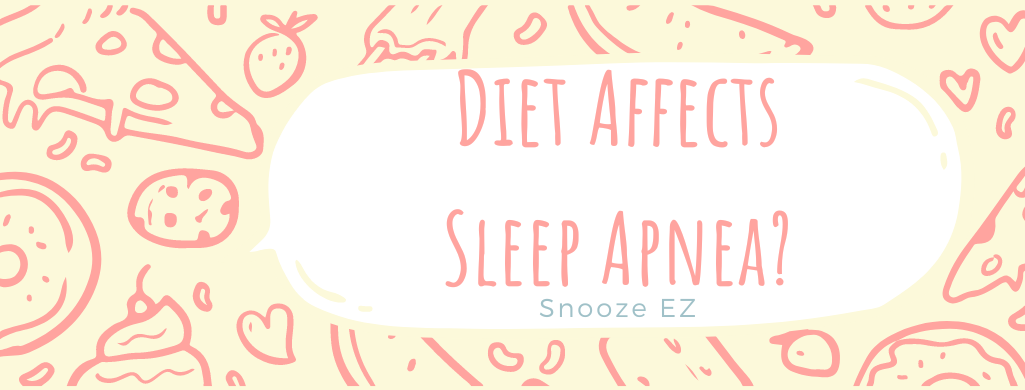Yes, by going on a diet, symptoms of sleep apnea can possibly be reduced or alleviated.
Mostly due to obesity, there are millions suffering from obstructive sleep apnea (OSA) every night.
OSA happens when someone has periodic pauses in breathing while they sleep due to an obstruction.
The obstruction can be caused by all sorts of reasons, but we are going to cover the most popular reason, which is obesity.
Let us dive into how diet affects sleep apnea and which foods you should eat and avoid to help symptoms of OSA.
Does diet affect sleep apnea?
Obesity can be fixed in most people by going on a diet. Then, if obesity is the culprit of your sleep apnea woes, then sleep apnea can also be helped or even alleviated by losing weight.
Research has uncovered the connection between diet and sleep apnea. It appears that nutrition plays an important role in maintaining good quality sleep and reducing symptoms of the disorder.
A study performed by JAMA Network Open took 89 men who were all obese and all had mild to severe sleep apnea.
All were on CPAP (continous positive airway pressure) treatment for OSA.
The men were split into two groups. One group was put on an exercise, diet, and a simple lifestyle change regimen. The other was asked to do nothing at all.
The diet did not restrict calorie intake. It only was designed so the participants would eat healthy and avoid unhealthy foods.
The participants were also asked to limit alcohol intake before bed and encouraged to stop smoking. Exercise was not rigorous and only included walking 15% more each day than usual.
They did this for only 8 weeks and 51% reduced their sleep apnea symptoms. Out of the 51%, 45% no longer needed to use a CPAP machine for treatment and 15% were completely cured and did not need any sort of treatment. On average, they lost 16 lbs.
It gets even better from there. The group that chose to continue to stay with their healthy habits were reevaluated 6 months later. The men who were able to sustain or lose more weight doubled in number that put sleep apnea into complete remission. Also, 62% at this point no longer needed to use a CPAP machine.
The men also reduced their chances of heart attack or stroke by over 30% due to lowering their blood pressure. By comparison, the control group lost around 1 lb on average and did not notice any change in the severity of symptoms of sleep apnea.
So, does diet affect sleep apnea? We would say a resounding yes!
What foods should you eat to help sleep apnea?
- Fruits & Vegetables – For obvious reasons, but vitamins, low-calorie, and just healthy!
- Omega-3 – Think fish here. Fish is healthy for you (no bad fat) and some like salmon have melatonin in them to help you sleep. If you hate fish, you can buy these as supplement.
- Melatonin Foods – Also popular as a supplement, but can be found in cherry juice, nuts, and eggs.
- Local Honey – It helps with allergies and inflammation. Both these are issues that can cause blockage in your airway.
- Green Tea – Helps with inflammation as well in the throat and has antioxidants.
- Tryptophan – Chicken, tuna, whole grain oats all have this. All these have serotonin which promotes good mood and sleep.
What foods should you avoid to help sleep apnea?
- Fatty Meats – Anything with saturated fat should be avoided or eaten in moderation. Fatty meats such as processed meat, the worst, and pork and red meat are high in saturated fat.
- Refined Carbohydrates – Carbohydrates and sugar are your enemy. Reduce as much as possible.
- Alcohol – Drinking alcohol before bedtime is a no, no and drinking too much will make you gain weight.
- Dairy – Most dairy has saturated fat. Again, reduce or stay away.
- Bananas – Weird, because these are usually a healthy fruit, but for sleep apnea they increase slimy mucus production at night.
- Sodas – Sugar, caffeine, carbonated water. Nothing is ‘good for you’ about it.
Conclusion
Diet plays an important role in positively, and negatively, affecting sleep apnea. A well-balanced diet full of nutrient-rich foods can help reduce the severity of sleep apnea symptoms and improve overall health and well-being.
Eating healthy and avoiding foods that cause weight gain, such as those high in sugar and saturated fat, is a good start.
Additionally, regular physical activity can also be beneficial for people with sleep apnea, as it helps maintain a healthy weight.
Can sleep apnea also affect mood and behaviors? You may be surprised how it affects kids.


